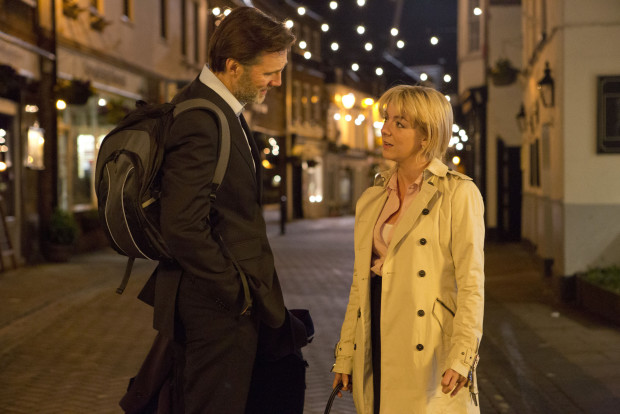BBC One
6/7th January 2014
120 mins
Starring: David Morrissey, Sheridan Smith, Olivia Colman, Sean Maguire
Mundane routine plagues the lives of two commuters on the 7.39am morning train to London. Brought together by a scene we can all relate to, the battle for the last remaining seat, Carl(Morrissey) and Sally (Smith) break the unwritten rule of the train, the embargo of silence, and dare to speak. Their subsequent journeys into London soon become the most anticipated event of their day as, despite their obvious age difference, the two connect not just through the tedium of their journey but because of their restrictive home lives too.
In an initial discussion Carl calculates that the passengers of the 7.39 spend 37 days a year on the two and a bit hour train journey (unless there’s a delay of course, amazingly there never is), which equates to “1 year in every 10…that’s more than I spend with my kids…still don’t know anyone’s name”. The statistics are startling and for Carl, our veteran of the morning commute, whose home life with two teenage children does not fare any less monotonous or isolating than the commute itself, escape is understandably desperate. Sheridan Smith shines as a young, but mature divorcee, who is equally keen to find refuge away from being smothered by an overbearing fiancé (Maguire).
Their friendship blossoms inevitably into something more and, although the clandestine nature of their activity is morally questionable, we cannot help but encourage the pair. However the programme’s resolution renders this emotional investment in the characters quite irrelevant. Upon discovery the consequent ‘two years later’ summary sequence is slightly baffling and I’m afraid to say rather destroyed what, up until that moment, was a promising production.
Despite this the two-part drama was successful in considering a stark reality for many London commuters –the seemingly endless cycle of routine and isolation. Yet this is offers a wider critique of modern society where technology is replacing human interaction ironically often in order for people to communicate with others through means of virtual messaging. While having an affair is obviously not a recommended solution to this self-inflicted isolation, and arguably the connection between the two protagonists is only made possible from the fact that they are not plugged in to technology in the first place, the programme showcases the potential to relieve the daily repetition of ordinary events. Carl and Sally are a hopeful solution to the widespread concern that our society is rapidly declining in its ability to form a social community.


















No Comments